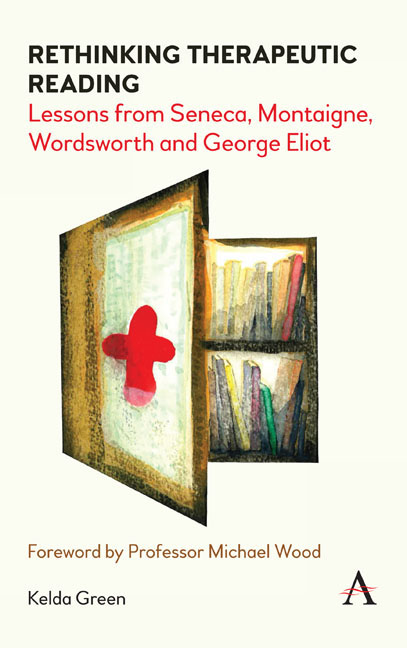Summary
This book is an exploration of the therapeutic potential held within literature. It examines the ways in which literature has served – since ancient times – as a repository for collective human thinking and a source of what we would now call therapy. It argues for the ongoing need for literary thinking and literary models of care, repair and human connection in the world today. Through a combination of literary analysis and practical experimentation, I have sought to provide a contribution to the relation of the reading of literature to the practice of psychology, arguing throughout that literature has a vital role to play in the real world, while insisting that the methods of close literary analysis and literary thinking are preserved.
Chapter 1 considers Cognitive Behavioural Therapy in relation to the Stoic philosophy out of which, it has been argued, it derives its origins. Through an examination of the letters of Seneca and the tragic vision that precedes them in his plays, I have sought to reconstruct a context for Stoic therapy within a more profound world order than is understood within the modern psychological therapies that have partially evolved from it.
Chapter 2 explores the essays of the sixteenth-century philosopher Montaigne, as a reader of Seneca. It examines his adaptation of Stoicism into a personal form of thinking within praxis, adding a further dimension to Seneca's epistles. It is argued that through reading, writing and rewriting, Montaigne creates an individualistic model for, but also counterexample to, what we might today call self-examination and self-help. The essays are also linked forward to both the self-reflexive processes of psychoanalysis and to Freud's own work as an essayist and thinker preoccupied with the individual self, with relation (for example) to Adam Phillips's Freudian-based work on the linkage between psychoanalysis and the reading of serious literature.
Chapter 3 takes a second major creative reader of Seneca two hundred years after Montaigne. It examines William Wordsworth's poetic use of Stoicism and his move beyond Stoicism towards a philosophy of transmutation. More broadly, this chapter presents the case for the particular and distinctly therapeutic forms of literary thinking that are contained within Wordsworth's poetry, not least because, as representative of a reformed poetic to serve ordinary life, it was held by several readers and commentators to be vital to the recuperation of the Western psyche.
- Type
- Chapter
- Information
- Rethinking Therapeutic ReadingLessons from Seneca, Montaigne, Wordsworth and George Eliot, pp. 1 - 6Publisher: Anthem PressPrint publication year: 2020



